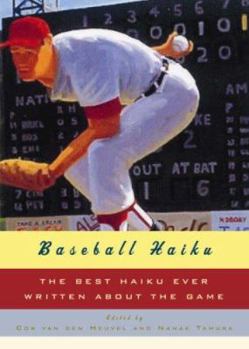Baseball Haiku: The Best Haiku Ever Written about the Game
Select Format
Select Condition 
Book Overview
There are moments in every baseball game that make fans catch their breath: the pause while a pitcher looks in for the sign, the moment a cocksure rookie gets picked off first, or the instant a batter lashes a game-winning homer into the night sky, just before the sell-out crowd explodes onto its feet. Haiku captures these moments like no other poetic form, and Baseball Haiku captures the sights, the sounds, the smells, and the emotions of the...
Format:Hardcover
Language:English
ISBN:0393062198
ISBN13:9780393062199
Release Date:April 2007
Publisher:W. W. Norton & Company
Length:256 Pages
Weight:0.70 lbs.
Dimensions:0.9" x 5.2" x 7.4"
Related Subjects
Asian Baseball Japanese & Haiku Poetry Sports & Outdoors Sports & Recreation WritingCustomer Reviews
3 ratings
Not an Oxymoron
Published by Thriftbooks.com User , 16 years ago
Baseball haiku is indeed a genre of which I was unaware. This is a wonderful book for fans of the lore of baseball, history, and the art of Haiku.
Those Moments Which Make Us Catch Our Breath
Published by Thriftbooks.com User , 16 years ago
The flyleaf of Baseball Haiku begins "there are moments in every baseball game that make fans catch their breath...Haiku captures these moments like no other poetic form..." and there you have it. If I had to choose the quintessential kigo (season word) for "summer", it would have to be "baseball". Although played in spring and autumn, nothing for me says "summer" like a baseball game (and at the beach, listening to a game on the radio). Jim Kacian slyly elevates the game to a religion: October revival all hands lift to the foul ball while Brenda Gannon has some wonderful plays (!) on sex: handsome pitcher my eyes drift down to the mound Many of Van Den Heuvel's own haiku deal with the anticipation of the game: baseball cards spread out on the bed April rain a spring breeze flutters the notice for baseball tryouts as well as my favourite: lingering snow the game of catch continues into evening The Japanese haiku have a definite and different expression but the feel and impressions are similar. My only wish is that there could be more!
Haiku Hits a Stand-up Double
Published by Thriftbooks.com User , 17 years ago
For a book of haiku --about baseball no less-- to break out into wider readership the way this book has is reminiscent of Dave Brubeck and Stan Getz bringing jazz into the popular music charts in the 1960's. My sister gave me this book for my birthday and, as Thomas Merton wrote, as long as it talks, I'm going to listen. Cor van den Heuvel and Nanae Tamura have assembled a tour de force of baseball haiku. America brought baseball to Japan and Japan gifted this country with haiku. There is a most enjoyable introduction about the history of baseball haiku in both countries. The book has a long section of haiku by well-known, and less well-known, haiku poets in the United States, followed by a rich collection of translated Japanese haiku featuring the game. Van den Heuvel concludes with an appreciative essay on baseball in the United States and Japan. Here are some samples which reflect moments which come in the world of baseball: walking home with his glove on his head shrieking cicadas Imai Sei summer afternoon the long fly ball to center field takes its time Cor van den Heuvel dog days of summer twenty-three games out of first Michael Ketchek This last poem sounds the tone of melancholy, called wabi in the classic Japanese haiku tradition, which many of the haiku in this book capture beautifully and hauntingly, and which is certainly is eventually present for any young or aging participant (or observer) in the game. Here are a few more evocations: while playing ball it becomes time to go home to supper Kawahigashi Hekigoto calm evening the ballgame play-by-play across the water Jim Kacian Baseball haiku, because of their brevity, will not provide the same kind of reading as Jimmy Breslin's writing about the 1962 Mets in his chapter "They're Afraid to Come Out," nor Ed Linn's reporting on Ted Williams' last game in 1960. But they make their own special offering. Speaking of melancholy, in my case I grew up in the 1950's in Kansas City, which gives a certain meaning to the term Kansas City Blues. By the way, Cor van den Heuvel loves jazz too. Get the book.





